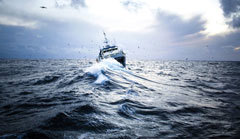Oceans, Fisheries and Maritime Affairs
The Faroe Islands give high priority to international cooperation, both bilaterally and multilaterally, when it comes to the sustainable use of living marine resources, ocean conservation and the promotion of blue growth. As an island nation highly dependent on the sea and its resources, the Faroe Islands are taking the lead to promote cooperation among Large Ocean Nations the world. The focus is on innovative approaches, based on island realities, to conserving and sustainably using the oceans, seas and marine resources, in line with the UN Sustainable Development Goal 14.
Fisheries
The marine ecosystems around the Faroe Islands and in the wider North Atlantic region are highly productive, with a diversity and abundance of marine species and stocks, which the Faroese exploit, both within the Faroese 200 mile exclusive fisheries zone, as well as in other zones and international waters.
The Faroe Islands have a long tradition of fishing in foreign and international waters, contributing to the development of many fisheries across the North Atlantic over the years. These fisheries are still an important part of total Faroese catches, both in volume and economic value. The possibility to fish across the region provides the Faroese industry with the scope and flexibility to pursue a variety of fisheries in the best seasons.
Aquaculture
The clean temperate oceanic waters and strong currents in the fjords around the Faroe Islands are ideal for fish farming, especially Atlantic salmon.
The Faroese aquaculture industry dates back to the 1960’s and has become a significant player on the international seafood market. Aquaculture now represents a major omponent of Faroese economic activity and around half of all Faroese export value is farmed fish.
Faroese aquaculture management has a clear focus on safeguarding the environment. This is fundamental to ensuring an economically self-sufficient and competitive aquaculture industry. Stringent regimes for veterinary monitoring, as well as measures to minimise the impact that rearing and production methods can have on the marine environment, have been a major factor in the success of Faroese fish farming.
With a total production from both capture fisheries and aquaculture of well over 500,000 tonnes annually, seafood products account for about 95 percent of Faroese exports of goods, making the Faroe Islands the largest per capita fisheries and aquaculture nation in the world.
Maritime Industries
Maritime transport routes are bringing new opportunities for increased economic activity in and around the Faroe Islands. With a long-standing seafaring culture and extensive maritime expertise, the Faroe Islands are well equipped to offer competitive services as a hub for the international maritime industry, both with cutting-edge know-how and skills, as well as with advanced harbour facilities and transport infrastructure.
The Faroe Islands International Ship Register – FAS - is a competitive alternative to other ship registers. For merchant ship owners around the world, the Faroese flag has come to signify high international safety standards, as well as a responsible and efficient administration with professional experience of shipping activities and maritime affairs. FAS is managed by the Faroese Maritime Authority.
International Cooperation
The Foreign Service of the Ministry of Foreign Affairs and Culture is responsible for coordinating and heading Faroese associate membership in UN bodies and Faroese participation in regional bodies for the management of fish and other marine resources.
The Ministry of Fisheries is responsible for consultations between coastal states on shared fish stocks. These include the large Northeast Atlantic pelagic stocks of mackerel, Atlanto-Scandian herring and blue whiting, in which the Faroe Islands have a major stake. The Ministry of Fisheries is also responsible for bilateral fisheries cooperation with other countries, including the EU, Russia, Norway, Iceland and Greenland. This cooperation provides for annual exchanges of fishing opportunities, giving foreign vessels quotas and access to the Faroese zone in exchange for fishing opportunities for the Faroese fleet in their zones.
More information on Faroese participation and membership in international organizations and regional bodies:
- UN Food and Agriculture Organization (FAO)
- UN International Maritime Organization (IMO)
- Northeast Atlantic Fisheries Commission (NEAFC)
- Northwest Atlantic Fisheries Organization (NAFO)
- North Atlantic Salmon Conservation Organization (NASCO)
- North Atlantic Marine Mammal Commission (NAMMCO)
- South Pacific Regional Fisheries Management Organisation (SPRFMO)

